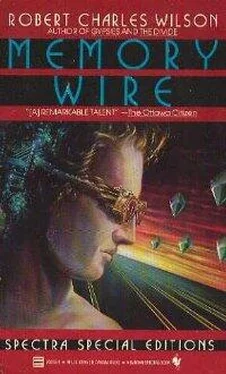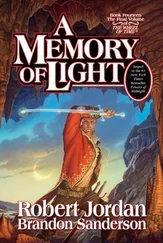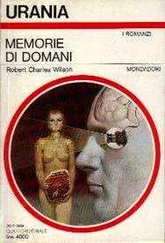Robert Wilson - Memory Wire
Здесь есть возможность читать онлайн «Robert Wilson - Memory Wire» весь текст электронной книги совершенно бесплатно (целиком полную версию без сокращений). В некоторых случаях можно слушать аудио, скачать через торрент в формате fb2 и присутствует краткое содержание. Год выпуска: 1987, ISBN: 1987, Издательство: Bantam Spectra, Жанр: Фантастика и фэнтези, на английском языке. Описание произведения, (предисловие) а так же отзывы посетителей доступны на портале библиотеки ЛибКат.
- Название:Memory Wire
- Автор:
- Издательство:Bantam Spectra
- Жанр:
- Год:1987
- ISBN:978-0-553-26853-9
- Рейтинг книги:4 / 5. Голосов: 1
-
Избранное:Добавить в избранное
- Отзывы:
-
Ваша оценка:
- 80
- 1
- 2
- 3
- 4
- 5
Memory Wire: краткое содержание, описание и аннотация
Предлагаем к чтению аннотацию, описание, краткое содержание или предисловие (зависит от того, что написал сам автор книги «Memory Wire»). Если вы не нашли необходимую информацию о книге — напишите в комментариях, мы постараемся отыскать её.
Memory Wire — читать онлайн бесплатно полную книгу (весь текст) целиком
Ниже представлен текст книги, разбитый по страницам. Система сохранения места последней прочитанной страницы, позволяет с удобством читать онлайн бесплатно книгу «Memory Wire», без необходимости каждый раз заново искать на чём Вы остановились. Поставьте закладку, и сможете в любой момент перейти на страницу, на которой закончили чтение.
Интервал:
Закладка:
He had turned and found Claudio himself watching from a few yards away. Meirelles froze. Panic boiled in his stomach; his testicles drew up toward his body. But it was only the routine suspicion Claudio directed toward everybody. “Hurry it up,” Claudio said, waving at him with disgust. “Get moving.”
At the wire barricade Meirelles had almost passed out with fear. His head was swimming; a cold sweat broke out on his forehead. His teeth began to chatter. He was certain his fear would give him away.
Perversely, it may have saved him. This was at the height of the Oropouche Virus epidemic, and the military guards had become squeamish of the formigas, especially if they showed any sign of infection. Meirelles, with his sweaty forehead and his chattering teeth, must have frightened them. He was frisked by a young and pale guard who touched Meirelles’s clothing as if he were touching a hot griddle, and then Meirelles was allowed to walk unmolested down the muddy hillside strewn with offal, to his shack, where he secreted the oneirolith inside his mattress.
It became a token of his independence from Claudio, a tangible embodiment of his pride, his hope, his future.
He had been born in the town of Cubatao and was one of the approximately one in five children there who survived to puberty.
Cubatao was an old industrial town. In the twentieth century it had been one of the most toxic places on the face of the earth, factories spewing out sulfur dioxide, carbon monoxide, and polychlorinated biphenyls into the valley air. The toxins denuded the hillsides and killed the children. In the first decade of the next century the factories had been nationalized… they were antique, but still, with their low overhead and negligible cleanup costs, very profitable. There were other places in the world said to be worse now. But the river valley remained very dangerous. The factories— modified but never modernized—spewed out new poisons: cyanide and arsenic compounds from the semiconductor lines, xylene, a substance called TCA.
Meirelles had a factory job running solvents in big rust-pocked canisters. He worked with a man named Ribeiro, a patriot who defended the factories whenever Meirelles suggested they might be old-fashioned or dangerous. “The factories,” Ribeiro said sternly, “are necessary for the wealth of Brazil.”
“No, no,” Meirelles said. “The dreamstones create the wealth of Brazil.”
“The stones,” Ribeiro said, “are sold to foreigners.”
“But in exchange for money. And with the money,” Meirelles persisted, “surely we could modernize the factories?”
“Nonsense! The money services the national debt. There’s nothing left over for the factories.”
“Then Brazil isn’t wealthy.”
“Not without the factories!” Ribeiro said proudly. “The factories are necessary to the wealth of Brazil.”
It was a logic he wished he could share. But Meirelles was married. He had a wife and a daughter. Twice in the last year Pia had fallen sick with bronchial ailments, and he knew she might not see her tenth birthday unless he found some other place to live. Most of the people Meirelles met were as complacent as Ribeiro—the will of God, they said—but he prided himself on his thoughtfulness, and knew it was time to leave.
There was of course no money. He supposed they could pack up their meager belongings and simply walk away, but he had heard terrifying stories about the camps for the homeless outside Rio and Sao Paulo. No, he thought, they needed money. And there was only one way Meirelles had heard of that a poor man could make the kind of money he needed.
Pau Seco.
It was a legend in the slums. Money in the ground, they said. Money from outer space. It was there for the taking. Everyone believed in it, although Meirelles noticed few believed in it strongly enough to attempt the journey, and those who did never seemed to report back. But then he woke one morning to find Pia down with the croup again, gasping, her face a sickly blue, and that afternoon he spent his last money buying medicine for her and then hiked down the road where a truck might pick him up. Under the circumstances he could not bear to stay.
Over the course of the day Meirelles made several journeys up and down the vertiginous walls of the mine. He was carrying bags of tailings away from the dig to the big wooden machines Claudio kept up top, which would sift the clay for Exotic stones and then dump the residue into a clotted ravine. His legs worked until the muscles knotted against him and he had to stop; his breath hissed in and out. He did not have the lungs of some of the younger men. He was not as efficient a formiga as some, and that worried him too: it meant Claudio might decide to get rid of him. Would he simply be fired, or would he be turned over to the military police? He didn’t know. There was no one he could ask. People moved in and out of this place like phantoms. Competitiveness was extreme, friendships rare.
Meirelles’s only friend in Pau Seco was the man called Ng. If “friend” was the word. Ng was a foreigner and had lived a life very different from Meirelles’s. Meirelles had heard Ng was looking for a deep-core oneirolith, and so he had approached the foreigner in a bar in the old town. They didn’t talk about the stone. Plainly, it was on both their minds; it was the reason they were together. But it was necessary to prepare the ground, Meirelles thought, and Ng seemed to understand this; they talked about the mine, they talked about the past.
They met several times, and Meirelles came to understand that the small quick-tempered Vietnamese was in some way like himself. Like Meirelles, Ng had cut himself adrift from the familiar world. Ng could have gone home after the war, lived out the life of a career soldier. But he had chosen to stay in Brazil. When Meirelles asked him why, Ng shrugged: it went beyond words. Meirelles understood.
“You’re a smuggler,” Meirelles said finally.
Ng blinked his narrow eyes. “Among other things, yes.”
“They say you want to buy a stone.”
“The right kind of stone.”
“They say the money is considerable.”
“The money,” Ng said, “is considerable.”
Meirelles lowered his voice so that it could hardly be heard above the rattle of glasses and the roar of conversation. “How do I know I can trust you?”
“You don’t,” Ng said flatly. “You trust me or you don’t. I can’t guarantee anything.”
“Ah,” Meirelles said.
But in the end he made the deal. And now the appointed day had come around at last and he was lashed with a nervousness that threatened to undo him. There were military police everywhere.
He looked up with dismay when the last whistle sounded. Already the deepest channels of the mine were flooded with shadow. The western wall was dark, the sky an inky blue. Inside the tents of the garimpeiros a few lanterns were burning. Meirelles shook his head: the time had eluded him.
Soon, he thought, you have to decide.
He trudged up the switchbacks and narrow ladders and was frisked again at the high link fence outside the compounds. His fear, this time, was no defense. A beefy military guard peered deep into Meirelles’s eyes and then searched him intimately, his hands probing Meirelles’s clothes while the other military men looked on and made ribald comments. “All right,” the guard said at last, contemptuously. “Go on.”
He went directly to his shack. He walked stiff-legged down the filthy hillside. His hand shook on the sheet of corrugated tin he used for a door.
The stone was still there, inside the mattress.
He took it out and stared at it angrily. It was the stone, he thought, that had put him in this impossible position. He had planned to meet Ng in a bar in the old town; and if I go, Meirelles thought, will he be there? Or maybe the military police—waiting for him?
Читать дальшеИнтервал:
Закладка:
Похожие книги на «Memory Wire»
Представляем Вашему вниманию похожие книги на «Memory Wire» списком для выбора. Мы отобрали схожую по названию и смыслу литературу в надежде предоставить читателям больше вариантов отыскать новые, интересные, ещё непрочитанные произведения.
Обсуждение, отзывы о книге «Memory Wire» и просто собственные мнения читателей. Оставьте ваши комментарии, напишите, что Вы думаете о произведении, его смысле или главных героях. Укажите что конкретно понравилось, а что нет, и почему Вы так считаете.












